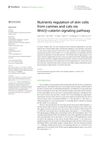 75 citations,
November 2016 in “Medicines”
75 citations,
November 2016 in “Medicines” Beta-sitosterol has potential health benefits but needs more research to fully understand its effects and improve its use in treatments.
 73 citations,
January 2013 in “Annals of Dermatology”
73 citations,
January 2013 in “Annals of Dermatology” People with hair loss, especially those with certain types, have lower zinc levels, and zinc supplements might help.
 72 citations,
February 2011 in “American Journal of Biological Anthropology”
72 citations,
February 2011 in “American Journal of Biological Anthropology” The conclusion is that recognizing hair growth cycles can improve the precision of dietary and health assessments from hair analysis.
 72 citations,
October 2010 in “Journal of The American Academy of Dermatology”
72 citations,
October 2010 in “Journal of The American Academy of Dermatology” Iron deficiency common in women, not always linked to hair loss; more research needed.
 63 citations,
September 1987 in “Journal of Biological Chemistry”
63 citations,
September 1987 in “Journal of Biological Chemistry” Minoxidil slows fibroblast growth and collagen production, potentially treating keloids, hypertrophic scars, and connective tissue disorders.
 61 citations,
May 2015 in “Planta”
61 citations,
May 2015 in “Planta” Certain fungi and bacteria help orchid seeds germinate and plants grow better.
 27 citations,
May 2010 in “Dermatologic Clinics”
27 citations,
May 2010 in “Dermatologic Clinics” Zinc can be a helpful secondary treatment for certain skin conditions, but more research is needed to guide its use.
 26 citations,
July 2003 in “Journal of Cutaneous Medicine and Surgery”
26 citations,
July 2003 in “Journal of Cutaneous Medicine and Surgery” Minoxidil solution safely and effectively treats hair loss.
 23 citations,
January 2010 in “Journal of Medical Primatology”
23 citations,
January 2010 in “Journal of Medical Primatology” Hair loss in Rhesus macaques may be caused by a skin allergy-related condition.
 16 citations,
January 2010 in “Indian Journal of Dermatology, Venereology and Leprology”
16 citations,
January 2010 in “Indian Journal of Dermatology, Venereology and Leprology” Children with HIV often have skin problems that can indicate the severity of their immune system damage.
 16 citations,
March 2007 in “The Veterinary clinics of North America. Food animal practice”
16 citations,
March 2007 in “The Veterinary clinics of North America. Food animal practice” Proper mineral supplementation in cow-calf operations prevents health issues and economic losses.
 15 citations,
January 2016 in “Przeglad Menopauzalny”
15 citations,
January 2016 in “Przeglad Menopauzalny” Eating a balanced diet with specific nutrients is important for menopausal women to manage hair loss.
 6 citations,
August 2019 in “PLOS ONE”
6 citations,
August 2019 in “PLOS ONE” Gambogic Amide helps maintain hair color and promotes hair growth.
 5 citations,
July 2018 in “Pediatrics”
5 citations,
July 2018 in “Pediatrics” A 3-year-old girl developed scurvy symptoms that improved with vitamin C but relapsed when supplementation stopped.
 4 citations,
July 2019 in “IOP conference series”
4 citations,
July 2019 in “IOP conference series” Most young men with early gray hair have low vitamin D but normal iron levels.
 3 citations,
November 2020 in “Curēus”
3 citations,
November 2020 in “Curēus” A child's hair loss from alopecia areata was fully reversed in five months using diet and supplements.
 3 citations,
November 2020 in “Biological Trace Element Research”
3 citations,
November 2020 in “Biological Trace Element Research” Men with hair loss may lack zinc, copper, and vitamin D; supplements could help.
 3 citations,
July 2017 in “Elsevier eBooks”
3 citations,
July 2017 in “Elsevier eBooks” Skin reactions are a common reason for emergency visits due to drug allergies, with some severe cases needing intensive care.
 3 citations,
February 2013 in “Bangladesh Journal of Medicine”
3 citations,
February 2013 in “Bangladesh Journal of Medicine” Low iron levels are linked to hair loss in women.
 2 citations,
July 2018 in “Elsevier eBooks”
2 citations,
July 2018 in “Elsevier eBooks” Some supplements may help with hair loss, but there's not enough strong evidence to recommend them without doctor advice.
 1 citations,
August 2023 in “Cutis”
1 citations,
August 2023 in “Cutis” Low ferritin levels can indicate iron deficiency as a cause of hair loss.
 1 citations,
December 2021 in “Pakistan biomedical journal”
1 citations,
December 2021 in “Pakistan biomedical journal” Eating certain seeds may help reduce symptoms of Polycystic Ovary Syndrome.
 1 citations,
November 2011 in “Dermatologica Sinica”
1 citations,
November 2011 in “Dermatologica Sinica” Women using hair relaxers with alopecia had lower zinc levels, suggesting zinc deficiency might contribute to hair loss.
 February 2025 in “Frontiers in Veterinary Science”
February 2025 in “Frontiers in Veterinary Science” Certain nutrients like keratin, egg yolk, and fish collagen may help pets regrow hair.
 January 2020 in “Asian journal of applied science and technology”
January 2020 in “Asian journal of applied science and technology” Good nutrition is crucial for health and preventing disease, and supplements can help prevent nutrient deficiencies.
 July 2018 in “Journal of College of Medical Sciences-nepal”
July 2018 in “Journal of College of Medical Sciences-nepal” Women with certain types of hair loss may have low iron levels.
 January 2018 in “International journal of medical biochemistry”
January 2018 in “International journal of medical biochemistry” Women with telogen effluvium have lower levels of iron, folate, and vitamin B12.
 March 2014 in “CRC Press eBooks”
March 2014 in “CRC Press eBooks” Some nutrients and antioxidants may improve skin and hair health, but more research is needed to confirm these benefits.
 724 citations,
April 2004 in “Lancet Oncology”
724 citations,
April 2004 in “Lancet Oncology” Chemotherapy in the first trimester of pregnancy is risky, but in the second and third trimesters, it's generally safe with careful drug selection and timing.
 369 citations,
June 2013 in “Biochimie”
369 citations,
June 2013 in “Biochimie” Myo-inositol supplements may improve insulin sensitivity and help with conditions like PCOS and gestational diabetes, but more research is needed.





























